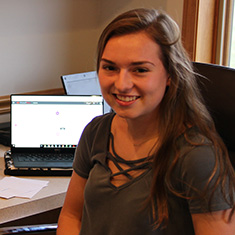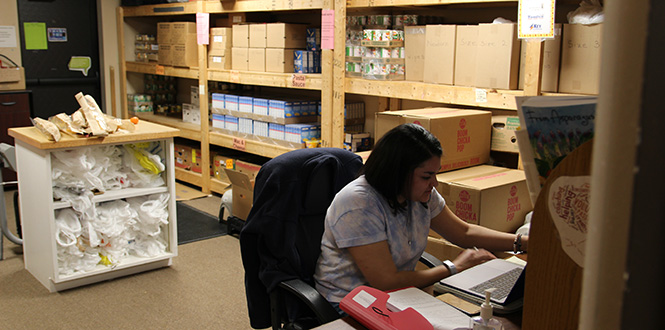CLS program connects Grinnell-area organizations with paid student volunteers
Apr. 16, 2019 — From local poverty alleviation organizations to schools and conservation groups, the city of Grinnell and surrounding communities are filled with people who welcome the help of Grinnell College volunteers.
Meanwhile, Grinnell College is filled with students who are eager to get more work experience and contribute to the community in mutually beneficial ways.
The Service Learning Work-Study Program, hosted by Grinnell’s Center for Careers, Life, and Service, is open to all Grinnell College students who are eligible for campus employment. The program provides community-based, campus employment positions; civic and professional development opportunities; and a dedicated peer learning community for all participants.
 Anika Jane Beamer ’22
Anika Jane Beamer ’22
Anika Jane Beamer ’22, works six hours a week with the Greater Poweshiek Community Foundation, which focuses on nonprofit development, endowment building, and connecting donors to local organizations. The Detroit, Michigan, native applied her first week on campus after learning about SLWS and started working in October.
“What I love so much about volunteering is that I feel a lot more rooted in Poweshiek County and Grinnell,” Beamer says. “I really enjoy being an assistant and learning about what the community needs and helping them fulfill those needs, and I’ve gotten to learn so much about the work people are doing here. It’s made me feel like Iowa is my second home.”
Under the supervision of the assistant director of service and social innovation, Keira Wilson, and community partner mentors, students have the opportunity to work with local nonprofit and governmental organizations. Each year, the College places between 40 to 50 students in positions with over 25 community partners in and around Grinnell. Community partners propose service positions, which then are posted on Handshake, the College’s online job and internship platform, explains Susan Sanning, associate dean and director of service & social innovation in the Center for Careers, Life & Service.
Community partners interview the student applicants, select the students who best fit their needs, and schedule service hours allocated to them in ways that benefit their organizations. Students are paid both for their work with their community partners and for attending professional development workshops on topics such as grant writing, volunteer recruitment, and project management.
For example, the Drake Community Library requested student assistance in digitizing county history as part of the Poweshiek County Preservation Program, while the Mayflower Community wanted support in coordinating and administrating the Adopt-a-Grandparent program.
“It’s been fun to be around the students and watch them work on real projects that matter to us,” said Mayflower executive director Steve Langerud. “SLWS is about having a social impact and a community development impact.”
Another example is student volunteers who help coordinate a resource room at Grinnell High School, providing food and clothing for students, as well as tutoring and informal mentoring.
“The middle school principal and staff got so excited about the program that they requested Grinnell students replicate a similar program for the middle school,” Sanning says. “The middle school program is now being piloted along with a Service Learning Work-Study after school art program and a social innovation mentoring project at the middle school.”
“The middle school staff got so excited about the program that Grinnell students replicated it at the middle school, and now one of the local elementary schools has started the program, too,” Sanning says.
 Malia Wells ’21 works an afternoon shift April 5 at Mid-Iowa Community Action, one of the community partners involved with Grinnell College’s Service Learning Work-Study Program.
Malia Wells ’21 works an afternoon shift April 5 at Mid-Iowa Community Action, one of the community partners involved with Grinnell College’s Service Learning Work-Study Program.
Other Service Learning Work-Study partners include Local Foods Connection, Mid Iowa Community Action, Immigrant Allies, Poweshiek County Soil and Water Conservation District, and the Blank Park Zoo. Organizations propose SLWS positions, though students, faculty, and staff can also suggest organizations for the program.
Beamer’s work with Greater Poweshiek Community Foundation has expanded her skills.
“I knew they were looking for someone with experience in grant writing, and I have some background in that,” says Beamer, who at age 11 got a grant from her church to host birthday parties for at-risk kids in a local afterschool tutoring program. She then partnered with a nearby school district to drop off ‘birthday bundles’ to homeless children so they could celebrate with friends and family.
Under the supervision of, Nicole Brua-Behrens, Greater Poweshiek Community Foundation executive director, Beamer is now working on developing a rolling grant program so money is available year-round for organizations in need, and she’s looking at survey data and interviews to assess the needs of young children and families in Poweshiek, Jasper, and Marion counties.
“I’ve gotten a lot of experience both creating surveys and compiling data, and my grant writing in general has improved a lot,” she says. “I did a big grant application, and I’ve also read and summarized grant applications to our organization.”
— by Anne Stein ’84